
Heroes Among Us: “You should have BIG SMILES every day”, With Jamie Gayton, EVP at PenFed Credit…
- May 13, 2019
- by
- Marco Derhy
Heroes Among Us: “You should have BIG SMILES every day”, With Jamie Gayton, EVP at PenFed Credit Union
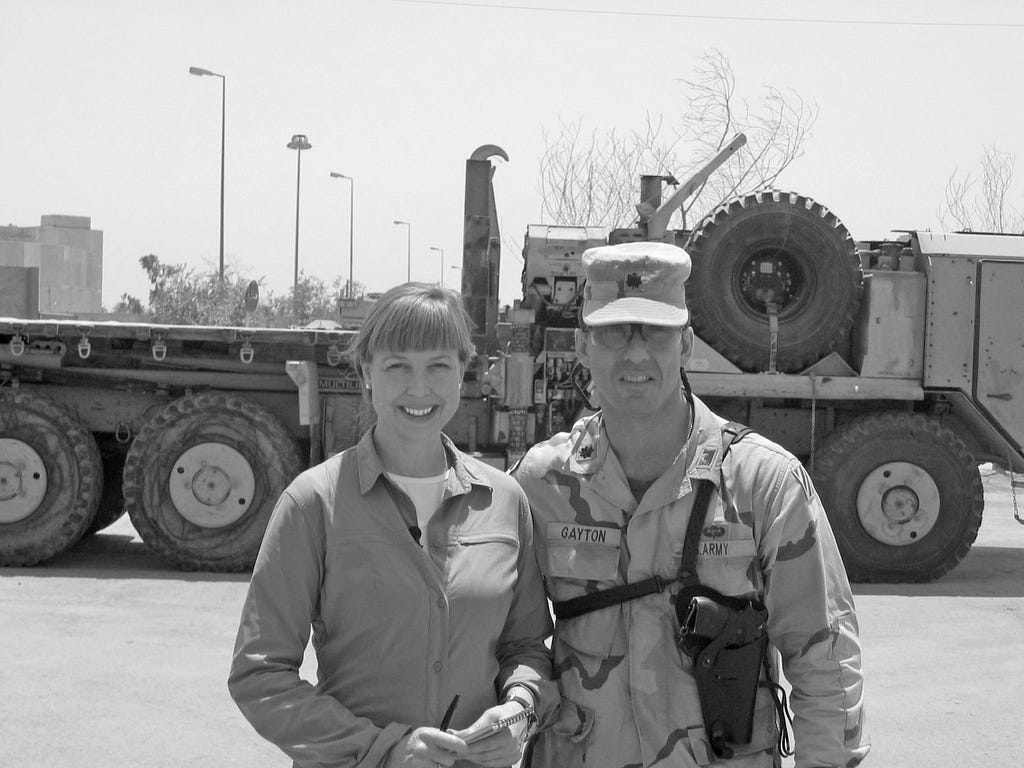
Love what you do. If not, reevaluate your career and your life. You should have BIG SMILES every day. You must go to work every day with a smile on your face. People want to be around positive people. When people ask how I am doing, my response is always, “Awesome.” If you ask my kids, “How is your dad doing?” they say the same. I have been known to sing the LEGO song in the morning at work: “Everything is awesome! Everything is cool when you’re part of a team. Everything is awesome when you’re living out a dream.” My email signature says BIG SMILES! rather than yours truly or very respectfully. I have had General Officers and Senior Executive Service officers ask me to explain my closing, and I tell them I believe it is important to set the tone of positivity. I have also had former students and soldiers reach out who remembered me by the moniker BIG SMILES at the bottom of my emails.
As a part of my series about “Life and Leadership Lessons Learned in the Military”, I had the pleasure of interviewing Dr. Jamie Gayton, Executive Vice President of Operations at PenFed Credit Union. Gayton oversees operations of PenFed service centers and financial centers, research and loan servicing. After leading teams in the U.S. military for 30 years with combat deployments to Iraq for Desert Shield/Storm in 1990–1991, and Operation Iraqi Freedom in 2005–2006, he joined PenFed in 2017. He earned degrees from West Point (B.S.), MIT Sloan (MBA) and Pardee RAND (Ph.D.). He previously taught economics at West Point and culminated his military career by teaching economics at the National Defense University’s Eisenhower School from 2015 to 2017.
Thank you so much for joining us Dr. Gayton! Can you tell us a bit about your childhood “backstory”?
My parents graduated from high school at 18, were married at 19 and had me at 20. My dad was one of 12 children, and his family ran a milk delivery business. My mother’s father was a Chemist at Union Carbide. I was born about 50 miles north of New York City and grew up not far from West Point.
I did well in school. I loved to participate in sports, especially basketball and baseball. I also played the trumpet and baritone and was a Boy Scout. My family sometimes attended Army Navy football games. It had been a dream of my grandfather to have a family member attend West Point — no one on my father’s side had ever attended college. My father was an insurance salesman, then a manager at a department store; my mother did the books for the milk business. My parents would always talk about how smart the students were in that school “on the other side of the mountain.”
We moved to Port Orange, Florida when I was in high school, but I never forgot this dream. I went to Jacksonville to interview for a nomination to West Point at the senator’s office, only to find out they didn’t have any nominations left. I then interviewed in Tampa, but I didn’t tell them what I thought they wanted to hear; I had decided to be honest in all my answers. Ultimately, Senator Lawton Chiles gave me my nomination, and this lesson in honesty has been one I have carried with me throughout my life.
I was accepted to both West Point and the U.S. Naval Academy, but I chose West Point. I started Beast Barracks in July 1983.
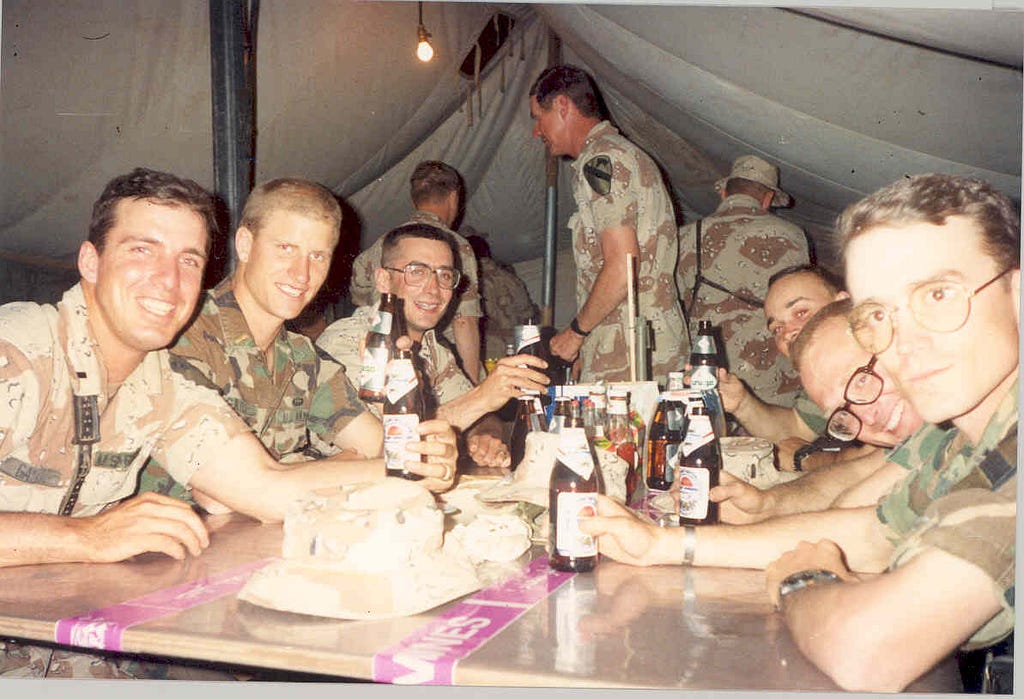
What are you doing today? Can you share a story that exemplifies the unique work that you are doing?
I serve as the Executive Vice President of Member Operations at PenFed Credit Union. The member operations team is amazing; we take great pride in serving our members and helping them to do better financially. We have over 900 teammates across 50 branches for in-person banking, five service centers for phone banking and problem resolution, and a merger integration team to streamline new member assimilation.
My role is to take care of my team so that they can take care of our members. We do this by collaborating to develop challenging yet attainable goals; allocating the necessary resources to achieve these goals; and empowering the leadership to “lead from the front” to get things done.
As an example of this in action, companies often assess themselves by how many “engaged” employees they have compared to “disengaged” employees. Engaged employees are passionate, committed, and emotionally connected to company goals. One of our 500-teammate service centers just achieved an extraordinary 14:1 score in this area.
PenFed’s CEO, James Schenck, and I both believe that financial literacy has the power to transform individuals, neighborhoods and entire communities. Following Hurricane Maria in Puerto Rico, we felt we needed to do something to help. So PenFed provided generators to all teammates. We also provided financial relief to members by allowing them to skip loan and credit card payments, and we provided fee-free ATM withdrawals for members and non-members.
During the three-year partnership started during the 2018–2019 school year, PenFed teamed up with EverFi — an educational software company specializing in personal finance software — to provide 10 high schools in Puerto Rico a 9-lesson course in personal finance. The goal is to help the next generation of students in Puerto Rico prepare themselves for leadership roles. Personally, I have always had a passion for finance and education — I wrote a book about personal finance, the proceeds of which go to a West Point program — so the work PenFed is doing with EverFi means a lot to me.
We held an event at St. Mary’s High School in San Juan to celebrate the school and their students as they were the first to embrace and complete the course. During the event, students gave testimonies on what they had learned and how their newfound skills had provided a foundation for success after graduation. The culminating activity was a form of “speed dating,” where students remained at tables while financial experts rotated among them. The students asked insightful questions that highlighted the power of the software and the depth of their learning, and we were really proud of them. And we are proud of the difference PenFed is making in helping the students of Puerto Rico recover from the storm and prepare for their future.
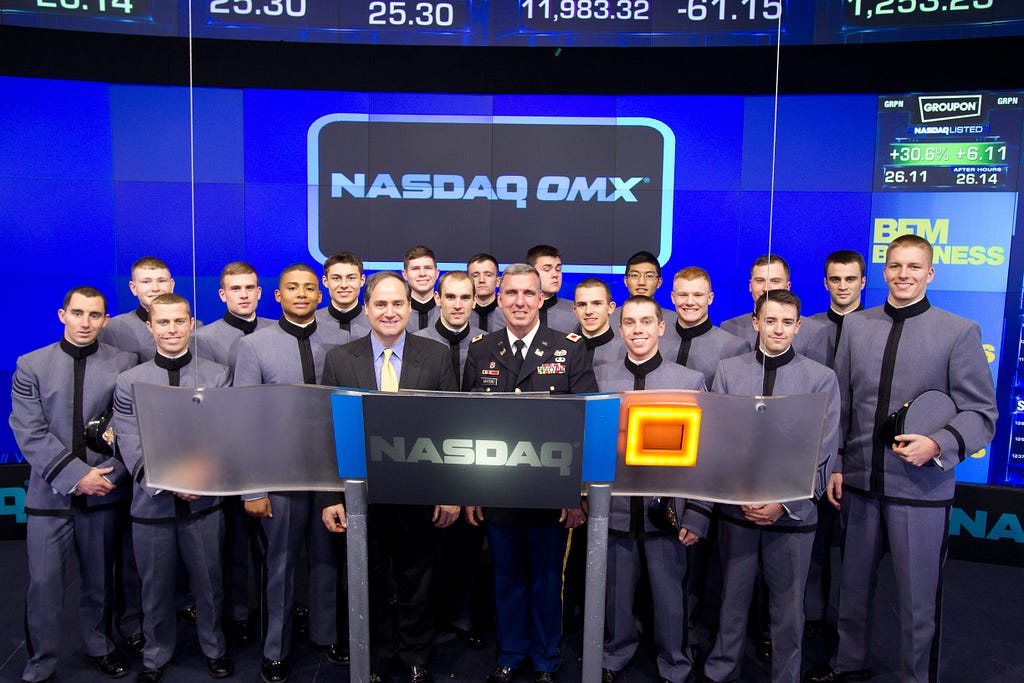
Can you tell us a bit about your military background?
I graduated from the United States Military Academy as a second Lieutenant in 1987 and branched as an Engineer Officer. Between 1990 and 1991, I deployed to Saudi Arabia and Iraq in support of Desert Shield and Desert Storm. I was second in command of a 180-soldier engineer company supporting the attack in Iraq.
Following company command, I earned an MBA from the Sloan School at MIT and was selected to return to West Point to teach economics. I had wanted to teach economics at West Point since taking Major John C. Adams’ economics course during my time there. I taught economics for two years, and before the second year, I was selected as the course director for the core course in economics, which is required of all West Point students.
After this position, I served as an executive officer to a 450-soldier engineer battalion, then was assigned to the Pentagon in the human resources office of the G1, LTG Maude. I arrived at the Pentagon in August 2001 and was on temporary duty away from the Pentagon on 9/11. My sponsor and other members of my team who were at the office that day were killed. I flew back to Andrews Air Force Base on an Army jet that evening. LTG Maude had been killed in the attack, so the Deputy G1 and I (along with many others) had to officially account for the missing and the dead. After taking the first-hand accounts of survivors and those who had reentered the building to rescue those who were still inside, I wrote the posthumous and valorous awards for all members within the G1’s purview. I should have been there that day, and at the funerals I know my family was thinking about how it could have been me in those coffins.
I was asked to become the military assistant/aide to the new 3-star G1 of the Army. I wrote speeches, built presentations, coordinated travel and traveled with him across the United States and around the world. A 12-month tour turned into a 22-month assignment. He was a real mentor to me, so much so that when I left the job he gave me his father’s West Point cuff links.
I was then selected for command of a battalion at Fort Stewart, GA. After training for 6 months, our battalion deployed to Iraq for a year, from 2005 to 2006. My battalion was responsible for providing intelligence, communications support and reconstruction operations.
We instituted three major initiatives in reconstruction. First, we transitioned all construction project proposals to a website to allow broader dissemination, rather than just relying on the local sheiks or the large multinational engineering firms bidding on projects. It was a huge win, as competition drove the number of bids up, the prices down, and the quality up. Second, we embraced the media. I provided a face-to-face 20-minute overview of our projects to any media who put in a request to come to Iraq, and I took them to locations where we were completing projects to talk with the locals. Reporters included Martha Raddatz, Kimberly Dozier, Jennifer Eccleston, T. Christian Miller, and Hugh Sykes. Third, we instituted a local Media campaign, traveling on a weekly basis to District Advisory Council (DAC) meetings to provide updates in Arabic and English on completed projects, ongoing projects, and proposed projects.
Following battalion command, I earned a Ph.D. from the Pardee RAND Graduate School in Santa Monica, returned to West Point to teach, and deployed with my family to South Korea for two years, where my team oversaw the $10.7 billion construction at Camp Humphreys Korea.
My final Army tour was teaching Economics of National Security at the Eisenhower School, National Defense University in Fort McNair, DC, where I led the school’s National Security Exercise for two years. I retired in 2017 as a Colonel.
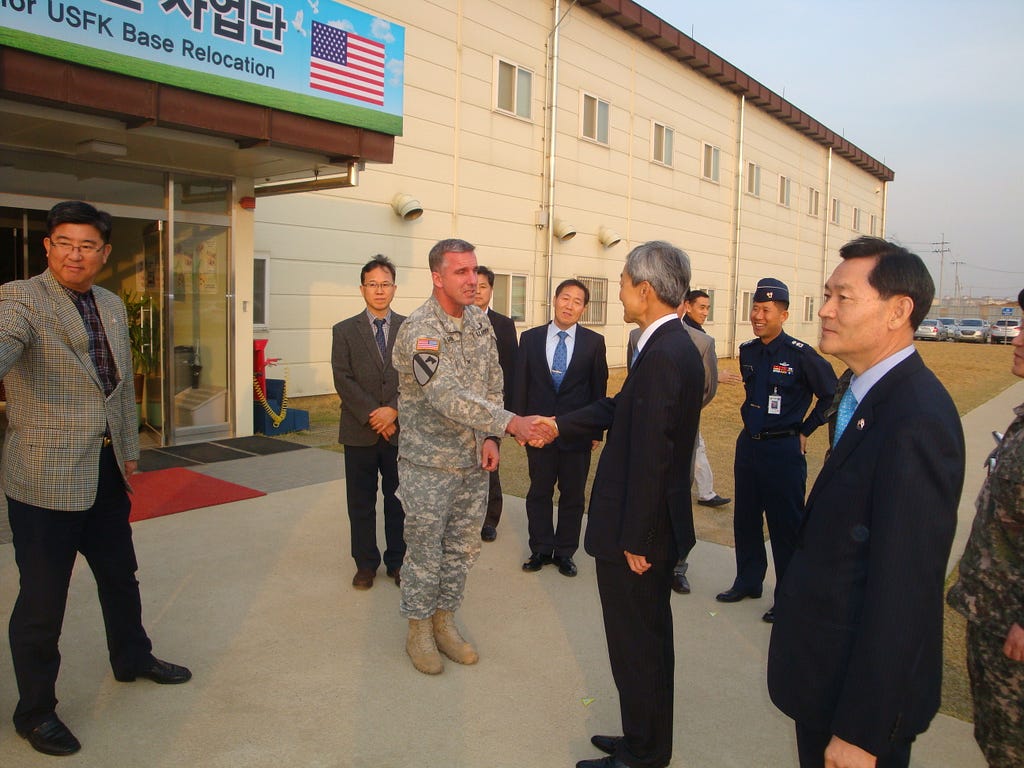
Can you share the most interesting story that you experienced during your military career? What “take away” did you learn from that story?
When I was a Major, I was assigned to a staff engineer position for the first time. I was overseeing a team of about 12 officers and enlisted soldiers, and one of my female Lieutenants got pregnant. The Army has established a very strict protocol for the number of hours a pregnant service member can work depending on the trimester of her pregnancy. When she began her next trimester, I stopped by her desk and reminded her that she need to leave the office at 1430 every afternoon. She was a hard-charging engineer officer who wanted to excel, but there is a culture in the military of not wanting to appear weak and wanting always to exceed the standard. She replied that she just had to finish a few things — essentially saying that she appreciated my acknowledgement of the rules but that she would push through to maintain her status. I told her she needed to leave, not only for her health but to set the example for those women who were junior to her.
Twenty years later, she remains in contact as a mentee, sharing her successes and seeking advice. When this woman introduces me to friends and colleagues, she often tells this story to share her gratitude for my impact on her leadership philosophy and her career. At the time, I had no idea that my actions would ease the feeling she and many pregnant females had that they had to ignore the standards to maintain respect.
Now, her daughter attends West Point (I wrote a recommendation) and is currently finishing her Plebe year. I could not be prouder of this mother-daughter team.
Another experience taught me that honesty is always the best policy, even if it’s not what someone wants to hear. While serving as a battalion commander in Iraq, I was responsible for non-lethal effects, using the provision of essential services, like sewer, water, electric, trash, health, police, and fire, to win the support of the local communities; improve stability and security; and allow the fledgling government to assume responsibility and control.
On one of my first meetings, a senior Sheik took me aside and asked me when the district would receive its hospital project. He said the last two commanders had promised him a hospital. I had recently reviewed the prioritized list for the region, so I looked at Sheik Kamal and said, “Sheik, I wish I had better news for you, but even though your project is on the prioritized list, it is so far down that I do not think you will see a hospital in your district. We’ve started a hospital project in Sadr City, and that will be the hospital that your district will have to use.”
Sheik Kamal was a very powerful man, and others had urged me not to cross him. He looked at me with a smile and said, “LTC Gayton, you are the first officer that has been honest with me about this hospital. All the others told me I would get one. I know we will be able to work together to help my district because I know you will always be truthful with me.”
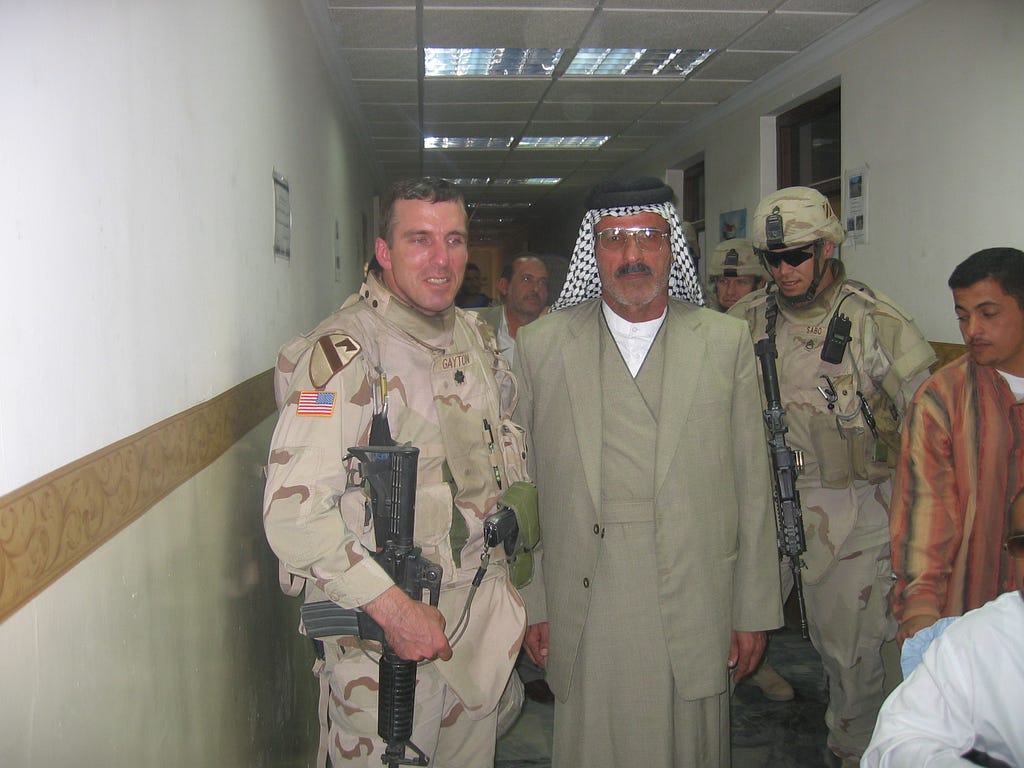
I’m interested in fleshing out what a hero is. Did you experience or hear about a story of heroism, during your military experience? Can you share that story with us? Feel free to be as elaborate as you’d like.
About five years after the female Lieutenant I mentioned had her second child, she reached out to tell my wife and I that she was being abused by her husband. She had left the military to care for her children, and she shared stories of his abuse and his unabashed infidelity. She was scared that if she left him, she would not be able to provide for her children. She would lose her place to live, her military benefits, her income, her support network and her “military” way of life.
My wife and I spent many days counseling her on her options and urging her to take care of herself and her family, despite the uncertainty about what the future would hold. She ultimately made the call to leave her husband and return to her hometown. Despite being a single mom with two young children, she managed to secure a great job, reestablish her kids in school and ultimately remarry. I consider her actions heroic. She knew what she needed to do for the sake of her safety and the long-term wellbeing of her family. But she had to walk away from a marriage she held sacred and give up the stability of healthcare, housing, income and a culture that she loved. The choice seems simple… Until you are in the position of having to start over with nothing except your children and your possessions.
A second example happened while I was deployed in Iraq. My personal security detachment and I visited project sites and attended meetings six days a week in some of the most volatile areas in eastern Baghdad. On May 1, 2005, we were visiting a temporary pump station in Zafaraniyah. I dismounted with my interpreter and a three-soldier security team to inspect the temporary pump and ensure the team was making progress toward completion.
My team of three vehicles was parked along the side of the road with dismounted security in the front and the rear and turret gunners at the ready. While walking back to our vehicles, there was a loud explosion. A vehicle-borne Improvised Explosive Device (VBIED) had detonated at the rear of my team of three vehicles. Several Soldiers were injured, one very seriously. Our interpreters were non-combatants and therefore did not carry weapons. In the chaos of the attack, and understanding the gravity of our situation, one of them grabbed the weapon of one of my injured solders and ran to secure our perimeter. I remember hearing him scream, “How do you use this thing? How do I fire this weapon?”
Rather than hiding in a vehicle, or running to blend in with the local population, this Iraqi interpreter helped defend us. In the face of danger, he did what he needed to do, when it needed to be done, without being told to do it … despite the potential risks.
Based on that story, how would you define what a “hero” is? Can you explain?
I believe a hero is doing what needs to be done, when it needs to be done, without being told to do it, when there is a physical, mental, or emotional risk to your personal well-being.
Does a person need to be facing a life and death situation to do something heroic or to be called a hero?
I believe there needs to be some risk, but it could be a risk other than physical life or death.
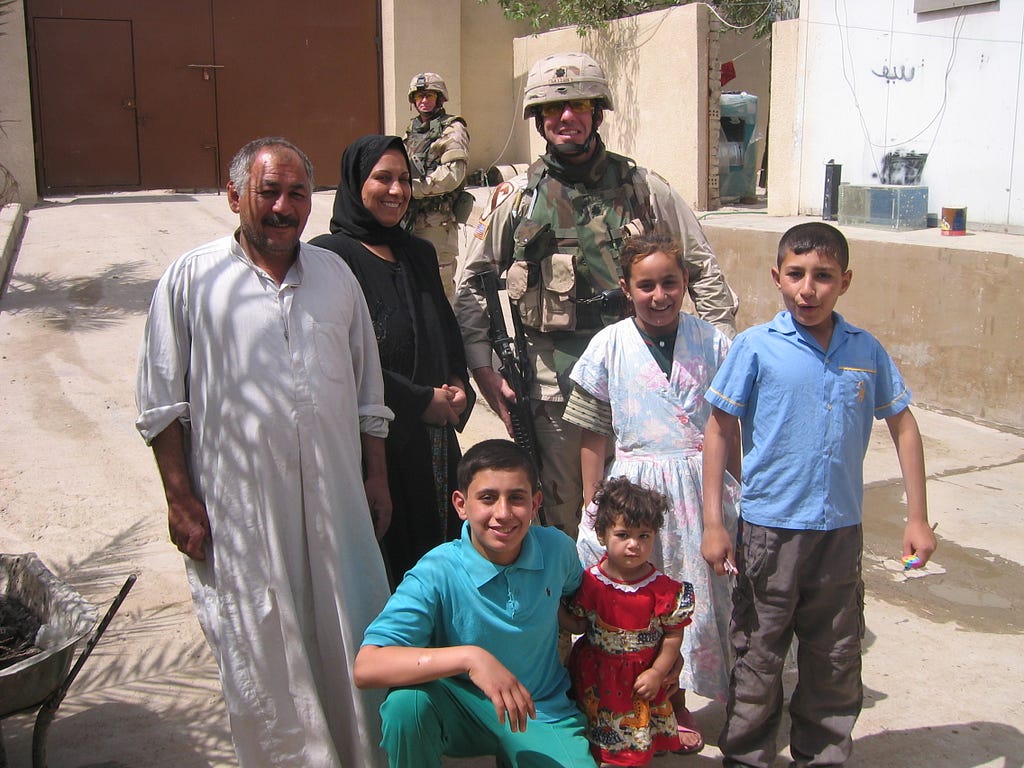
Based on your military experience, can you share with our readers 5 Leadership or Life Lessons that you learned from your experience”?
- Establish and enforce standards, discipline, and values. There are no “redos” on ethics; one error can lose someone’s trust forever. If I had not upheld the standard and my personal ethics with the case of the pregnant Lieutenant I mentioned above, I could have lost not only her trust but the trust of many of those working under me.
- Identify and align objectives and counsel, counsel, counsel! Know the goals and objectives of your boss, and make sure you and your subordinates synchronize have the same. Counseling allows a leader to align objectives and then step back and watch a junior leader solve problems, develop innovative solutions, and show potential. I especially believe that regular counseling creates loyalty. Counseling others freed me from being a micro-manager and allowed me to focus on recognizing my subordinates’ outstanding performance. When I took battalion command, my Command Sergeant Major (CSM) had already worked with several other commanders. I told him that on our first day, we would sit down for an hour and do a thorough counseling. He looked at me with a puzzled look and said, “Sir, I know what I am doing. I don’t need to be counseled.” I told him that my goal was to establish a shared understanding of his responsibilities so we both knew what was important and where he would contribute the most. On a quarterly basis, we had a counseling session where I provided feedback and also a draft of his evaluation, showing where he had earned excellence (with tangible bullet comments) and where he was satisfactory. This feedback allowed him to focus his energy. At evaluation time, he earned an “excellent” evaluation in every category.We have both long-since retired, but we still regularly talk on the phone and see each other about once per year. Counseling allowed us to build an unbreakable trust, after that first awkward moment.
- Praise publicly and aggressively when earned; criticize privately and developmentally when appropriate. People respond to praise. It helps incentivize and motivate continued excellent performance. I know countless individuals who have gone on to military promotions, business success, and “life” successes following our work together. The same goes for looking someone in the eye and telling him or her that they have not met the standard. I took command of a company in 1992 at Fort Knox, Kentucky. One of my platoons was already at Fort Bliss in El Paso Texas, conducting a field exercise. A group of underaged soldiers went out drinking and destroyed some property on post. One of the soldiers was a very smart kid who had been in trouble several times. I told him that he had been given enough chances and that he would be put out of the Army. Several of his leaders protested, but I felt it was the right thing to do. Five years later, when I was teaching economics at West Point, I received an email from a young man that said, “If this is the same BIG SMILES Gayton who commanded a company at Fort Knox, Kentucky, I just want you to know that you’re putting me out of the Army was the best thing that ever happened to me. After leaving, I went back to my home state and became an at-risk youth counselor. I love this job, because I am able to help young folks who were in the same situation as me. Thank you for holding the line and helping me find my calling.” Moments like this are what make all the hard work worthwhile.
- Time is gold. Be where your teams most need your support. This could mean late nights in the motor pool with your team as they repair an engine; being outdoors in the rain while completing a training exercise; or being the first one up and the last one to bed. Your teams want to see that you are willing to work in the trenches just like them. Now, this means I travel to attend dinners, speak at events, and promote people in front of their peers and in person when possible. We just completed a promotion for a long-time employee who does an extraordinary job. It meant so much to him, and it reminded me that even when I am tired or busy, it is important to do things like this.
- Love what you do. If not, reevaluate your career and your life. You should have BIG SMILES every day. You must go to work every day with a smile on your face. People want to be around positive people. When people ask how I am doing, my response is always, “Awesome.” If you ask my kids, “How is your dad doing?” they say the same. I have been known to sing the LEGO song in the morning at work: “Everything is awesome! Everything is cool when you’re part of a team. Everything is awesome when you’re living out a dream.” My email signature says BIG SMILES! rather than yours truly or very respectfully. I have had General Officers and Senior Executive Service officers ask me to explain my closing, and I tell them I believe it is important to set the tone of positivity. I have also had former students and soldiers reach out who remembered me by the moniker BIG SMILES at the bottom of my emails.
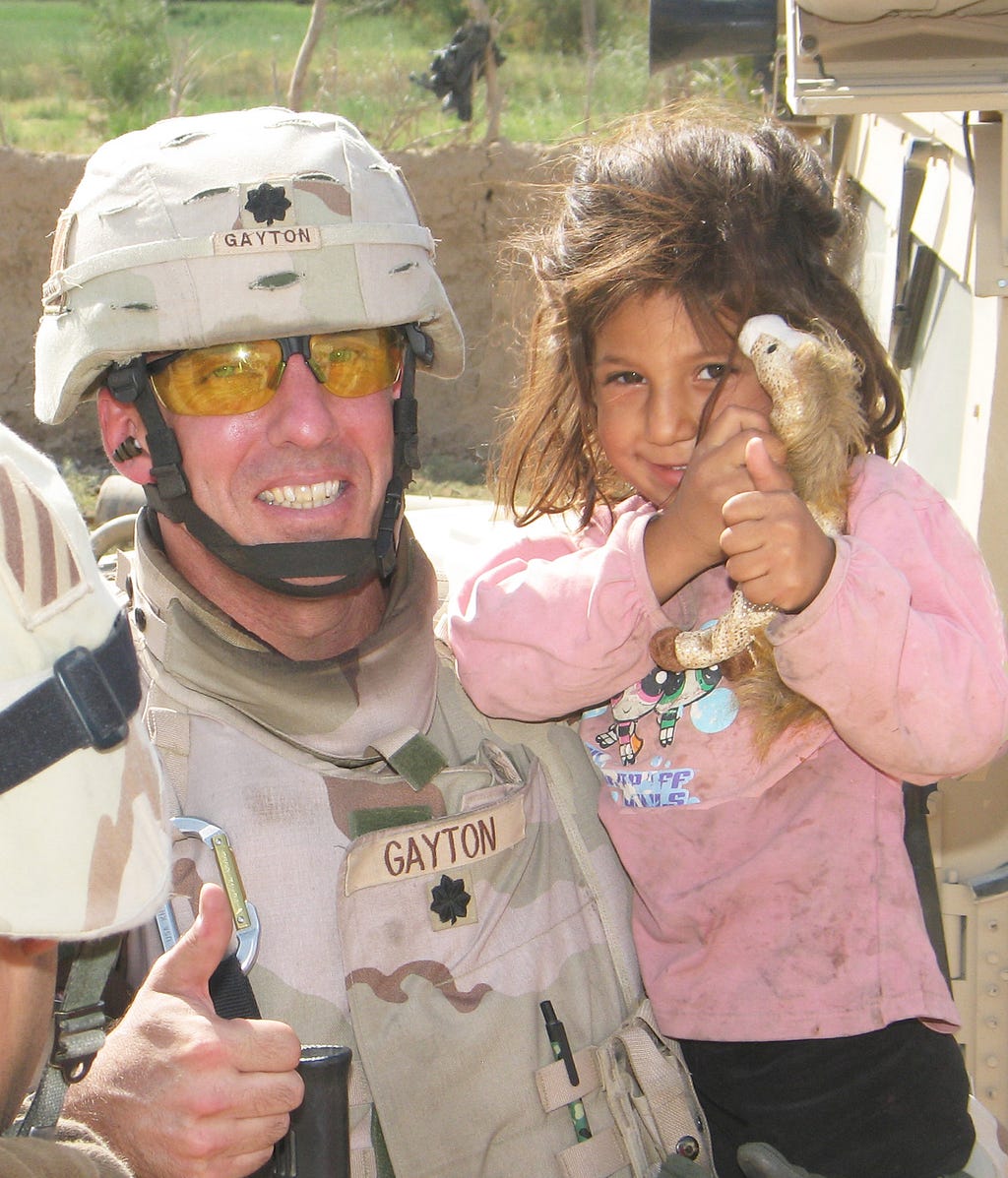
Do you think your being in the military helped prepare you for business? Can you explain?
Without question. Starting as a Lieutenant I was responsible for about 30 soldiers. Every successive job added responsibilities for managing budgets, equipment and time and leading teammates. Every leadership trait, characteristic and philosophy I owe to my time at West Point and serving in the Army. Taking care of your teammates, employees or soldiers is the key to having a dedicated, loyal, high-functioning team that cares about achieving the mission and not letting themselves or their peers down. My parents’ values of honesty, integrity, and doing your best always, and my experiences in the Army, have made me who I am today. Leading and taking care of people in the business world is no different than in the military.
Why did you leave the Army? How did you know it was the right time to leave?
If you’re not a General, you have to retire at 30 years — so it was time, although I loved the military, and my family loved it. When I got a Ph.D., I walked away from the possibility of being a General, and I knew when it was time to retire. I wanted to be in the finance field, so I reached out to a handful of people in wealth management and at financial institutions. When I had lunch with PenFed President/CEO James Schenck and members of PenFed’s leadership team, I thought it was just an educational lunch, but it turned into an interview. I chose to work for PenFed for its culture, leadership opportunities and opportunities for advancement. I started as the Director of Strategies and Policies and then was promoted him to Vice President and then Executive Vice President. I love what I am doing and cannot see myself anywhere else. The teamwork really resonates with me.
My philosophy is that you should always do your best to take care of your people. Then, they take care of the members, and it’s a better organization. You have to know their issues and concerns, what is going well and what is not. People know if you truly care or if it’s lip service. If they know you care, they will do anything for you.
As you know, some people are scarred for life by their experience in the military. How did you struggle after your deployment was over? What have you done to adjust and thrive in civilian life that others may want to emulate?
I have been fortunate in that I have not experienced any post-traumatic stress as a result of my service in the Army. I have always been thankful for the circumstances I have been in that could have been far worse. But all people react differently under stress. During our VBIED attack, I had one soldier throw his weapon down and hide under one of our vehicles. Incidentally, he had been one of the more vocal soldiers before the attack about what he would do and how he would respond in an attack.
You never know how folks will respond when they experience combat or a traumatic event. Nor can you predict how they will respond after the event. I learned in the aftermath of the Pentagon attack to require everyone to attend some group counseling sessions and at least one individual counseling session after a traumatic event. By making it mandatory, it helped remove the stigma of going to the counselor’s office. Some continued with sessions, and others did not.
During the VBIED, my Operations Sergeant Major was critically wounded. He received two tourniquets, and after stabilizing in Baghdad and Germany, he was flown back to Walter Reed Military Medical Center in Washington DC to begin a long recovery. He lost both thumbs and elected to remain in the Army and deploy to Iraq for second time. On the other hand, five years after my personal bodyguard returned from Iraq, he took his life. The bottom line is that we all react differently, and we all need to be vigilant of how our teams respond to traumatic stimuli.
Are you working on any exciting new projects now? How do you think that will help people?
I served in the Army for 30 years because of the mission and the people. I transitioned to a career with a company that is closely aligned with my personal beliefs. Now, I take care of teammates so they can take care of the mission and our members. I have been blessed to take responsibility for Member Operations at PenFed. I oversee teams of dedicated professionals who provide members direct support at our 50 branches, phone support for our 1.8M members, and merger integration support to seamlessly integrate new members and assimilate new teammates. I tell everyone who will listen: I love my job and I love my team!
What advice would you give to other leaders to help their team to thrive?
Build a diverse team that is passionate, energetic and engaged. To do this, you must live this every day. Seek out candidates who use the word “we” rather than “I” when describing their past successes. Seek out candidates who, when asked to share their proudest moment, tell a story about the success of one of their subordinates.
When the team is successful, deflect all praise to the sub-team and/or team leads who executed the task. When the team has a shortfall, think about what you missed or did not anticipate. Love your team, and love your job!
What advice would you give to other leaders about the best way to manage a large team?
Leading a large team requires you to empower your direct reports to use their judgment and act. They have risen to their level based upon previous demonstrated competence and excellence. You must develop a trust and rapport with your senior leaders by explaining your leadership and management philosophies and then following through with actions that reinforce your beliefs. You must seek their input and incorporate it into your decision process. You must reinforce the actions and behaviors you desire and privately coach against the actions and behaviors you do not value. The best way to start this process is by establishing a detailed list of goals and objectives collaboratively with the team, and then providing performance feedback at fixed intervals.
None of us are able to achieve success without some help along the way. Is there a particular person who you are grateful towards who helped get you to where you are? Can you share a story about that?
There are probably 50 people I can point to who have had a significant impact on where I am today. Success is all about building great teams, having great mentors and taking care of each and every employee, teammate or soldier. I have had three noncommissioned officers who served as my counterparts at the platoon, company and battalion level: SFC Robert Marshall, 1SG Joseph Styres, and CSM Greg Watkins. They invested in me at each level, teaching me never to compromise my values, to always take care of my Soldiers, and never to shortchange training for mission accomplishment. Promotions in the military reflect the work of the teams you develop. I owe much of my success to their investment in me. I think the best testament to the bonds we established is that after 26 years, I am still in touch with 1SG Styres and his wife Valerie. Since 2005, I have maintained constant contact with CSM Watkins, talking on the phone a couple of times a year and seeing each other nearly annually. These deep, meaningful, relationships are what build teams that are unstoppable.
How have you used your success to bring goodness to the world?
I have a passion for personal finance. I do not believe we do enough as a country to prepare people for this critical skill. We require students to take several years of math, history, English and science, but in most schools, personal finance is not required and may not even be offered.
Because of this passion, I wrote a book, The Guide to Personal Financial Planning for the Armed Forces. All the proceeds from the book are donated directly to the Education Endowment fund at West Point, which is used to support the Investment Club, which I led for two years while I was teaching there. I have also volunteered to brief officer groups, enlisted groups, spouses groups, high school classes, and cadets to help them understand and begin their personal finance journey.
Most recently at PenFed, we decided to provide financial literacy software free of charge to ten high schools in Puerto Rico to help their next generation of leaders better understand how to leverage the power of personal finance into their long-term goals. We selected Puerto Rico to start this program following the devastation of Hurricane Maria. 75 students have already used the software and demonstrated their proficiency in the basics of personal finance including savings and checking accounts, credit scores, buying a car or house, and starting investments.
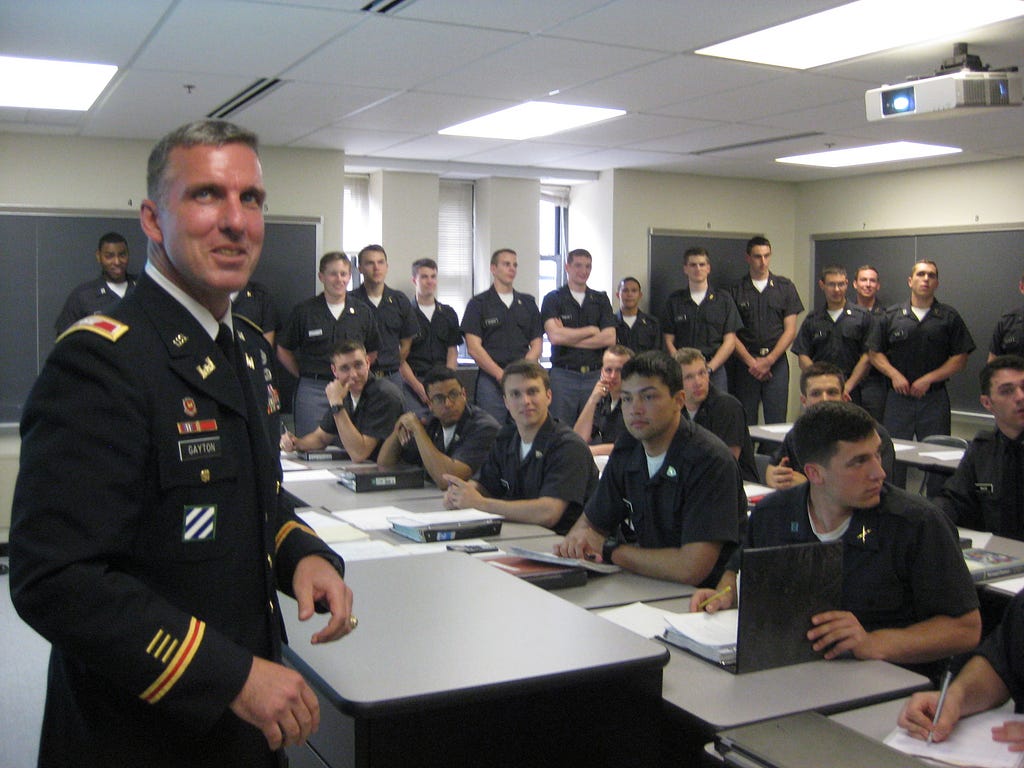
You are a person of great influence. If you could inspire a movement that would bring the most amount of good to the most amount of people, what would that be? You never know what your idea can trigger. 🙂
Financial literacy and personal finance should be universally taught in school. We should not assume that children will “pick it up as they go.” It is way too important of a topic for that. It is powerful, and it can be an equalizer across socioeconomic barriers. Those who understand and apply personal finance principles from an early age — the power of compounding returns — can achieve economic mobility. I am passionate about this topic and believe in my heart that it can be a great equalizer.
Can you please give us your favorite “Life Lesson Quote”? Can you share how that was relevant to you in your life?
Who is John Galt? This was a rallying cry by the author Ayn Rand. Ayn Rand wrote several books with the same general theme, highlighting the value of capitalism over communism, and how the former incentivizes innovation, development, and upward mobility (a true meritocracy), and the latter results in suppression of ideas, misallocation of resources, and lethargy.
We cannot promise everyone success. But we owe everyone opportunity.
Some of the biggest names in Business, VC funding, Sports, and Entertainment read this column. Is there a person in the world, or in the US with whom you would love to have a private breakfast or lunch with, and why? He or she might just see this if we tag them 🙂
Warren Buffet. I have always believed in the tortoise approach to investing, that a passive index fund is the way to go for the average investor. He is incredibly pragmatic, outspoken in his beliefs, and provides a fun and insightful annual meeting.
Heroes Among Us: “You should have BIG SMILES every day”, With Jamie Gayton, EVP at PenFed Credit… was originally published in Authority Magazine on Medium, where people are continuing the conversation by highlighting and responding to this story.



